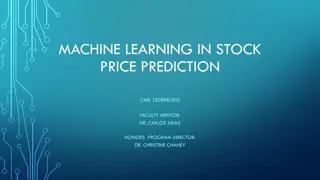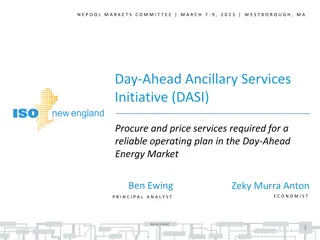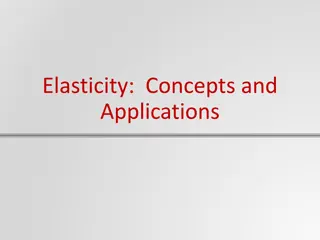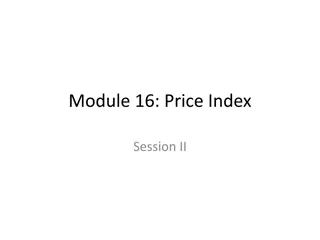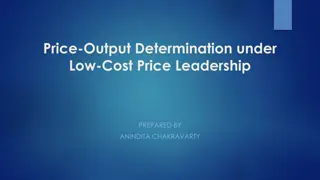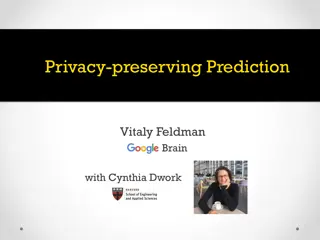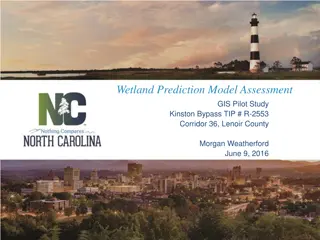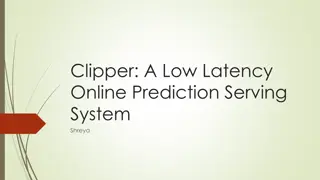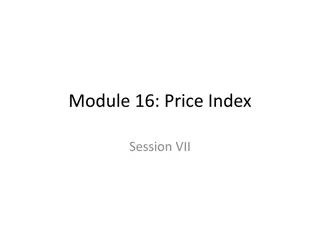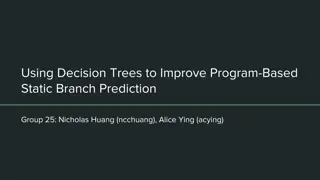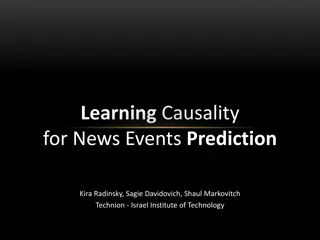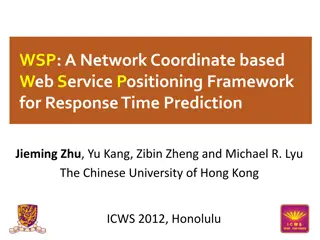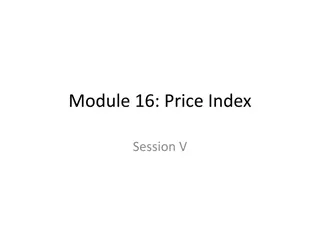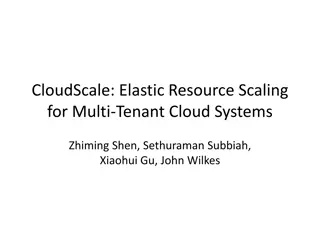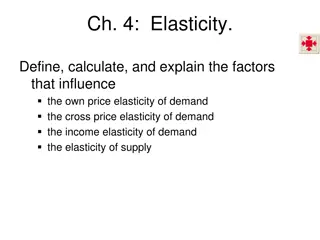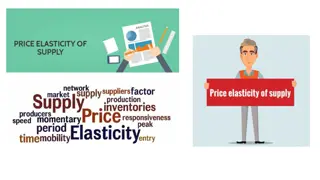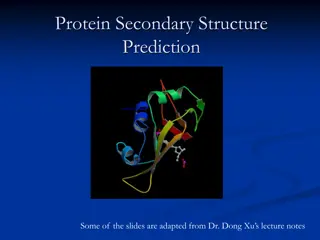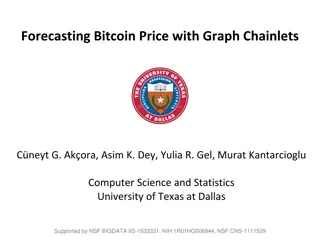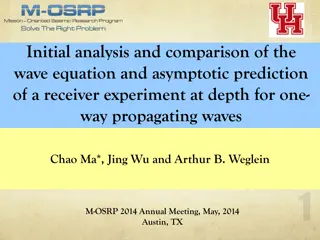Address Prediction and Recovery in EECS 470 Lecture Winter 2024
Explore the concepts of address prediction, recovery, and interrupt recovery in EECS 470 lecture featuring slides developed by prominent professors. Topics include branch predictors, limitations of Tomasulo's Algorithm, various prediction schemes, branch history tables, and more. Dive into bimodal,
0 views • 42 slides
Understanding H.264/AVC: Key Concepts and Features
Exploring the fundamentals of MPEG-4 Part 10, also known as H.264/AVC, this overview delves into the codec flow, macroblocks, slices, profiles, reference picture management, inter prediction techniques, motion vector compensation, and intra prediction methods used in this advanced video compression
2 views • 32 slides
Understanding Machine Learning for Stock Price Prediction
Explore the world of machine learning in stock price prediction, covering algorithms, neural networks, LSTM techniques, decision trees, ensemble learning, gradient boosting, and insightful results. Discover how machine learning minimizes cost functions and supports various learning paradigms for cla
2 views • 8 slides
Understanding Consumer Demand Principles and Elasticity Theories
Explore the theory of consumer demand, including the principles of price-demand relationship, homogeneity, symmetry, and price elasticity. Delve into the concepts of own-price elasticity, cross-price elasticity, and expenditure elasticity to understand how changes in prices and income affect consume
1 views • 8 slides
Day-Ahead Ancillary Services Initiative: Current Updates and Future Plans
The ISO-NE is introducing the Day-Ahead Ancillary Services Initiative (DASI) to procure and price ancillary services efficiently. Key discussions include the strike price adder approach and the Forward Reserve Market logistics. Stakeholder feedback is sought on the strike price adder concept, with c
0 views • 34 slides
Maximum Price Calculation for Callable Bond with Annual Yield Requirement
A 20-year callable bond example is provided with a $1000 face value and 3% annual coupons, callable at different redemption values over specific years. The task is to determine the maximum price a buyer should pay to achieve a minimum annual yield of 5%. The calculation involves identifying the time
0 views • 33 slides
Advancements in Air Pollution Prediction Models for Urban Centers
Efficient air pollution monitoring and prediction models are essential due to the increasing urbanization trend. This research aims to develop novel attention-based long-short term memory models for accurate air pollution prediction. By leveraging machine learning and deep learning approaches, the s
0 views • 17 slides
Understanding State of Charge Prediction in Lithium-ion Batteries
Explore the significance of State of Charge (SOC) prediction in lithium-ion batteries, focusing on battery degradation models, voltage characteristics, accurate SOC estimation, SOC prediction methodologies, and testing equipment like Digatron Lithium Cell Tester. The content delves into SOC manageme
0 views • 32 slides
KFRE: Validated Risk Prediction Tool for Kidney Replacement Therapy
KFRE, a validated risk prediction tool, aids in predicting the need for kidney replacement therapy in adults with chronic kidney disease. Developed in Canada in 2011, KFRE has undergone validation in over 30 countries, showing superior clinical accuracy in KRT prediction. Caution is advised when usi
0 views • 9 slides
Understanding Price Elasticity in Economics
Explore the key concepts of price elasticity in economics, including calculations, determinants, and applications. Understand the differences between price elasticity of demand and supply, learn how to calculate price elasticity, and interpret elasticity coefficients. Discover the responsiveness of
0 views • 31 slides
Understanding Price Indices in Economics
Exploring the concept of price indices in economics, focusing on composite price indexes, weighted and unweighted indices, and their importance in measuring relative prices. A practical illustration using the example of tea consumption showcases how price indices help in understanding cost changes o
0 views • 31 slides
Real-time Experimental Lightning Flash Prediction Report
This Real-time Experimental Lightning Flash Prediction Report presents a detailed analysis of lightning flash forecasts based on initial conditions. Prepared by a team at the Indian Institute of Tropical Meteorology, Ministry of Earth Sciences, India, the report includes data on accumulated total li
0 views • 6 slides
Price-Output Determination Under Low-Cost Price Leadership
Economists have developed models on price-output determination under price leadership, with assumptions about leader and follower behavior. In this scenario, two firms, A and B, with equal market share and homogeneous products, navigate pricing strategies based on cost differentials. Firm A, with lo
1 views • 7 slides
Privacy-Preserving Prediction and Learning in Machine Learning Research
Explore the concepts of privacy-preserving prediction and learning in machine learning research, including differential privacy, trade-offs, prediction APIs, membership inference attacks, label aggregation, classification via aggregation, and prediction stability. The content delves into the challen
0 views • 11 slides
Application of Price Adjustment in Civil Works Contracts: Lessons from Nigeria
The construction industry faces challenges due to price fluctuations in construction materials, especially in countries with unstable currencies. Civil works contracts funded by the World Bank are eligible for price adjustments if the contract duration exceeds 18 months. This presentation highlights
0 views • 21 slides
Understanding Weighted Price Indices in Economics
Weighted price indices are essential in economics to measure changes in prices over time. Different methods such as Laspeyre's and Paasche's price indices offer ways to calculate these indices using weighted averages. Fisher's index combines both methods to provide a comprehensive view. The weighted
3 views • 9 slides
Wetland Prediction Model Assessment in GIS Pilot Study for Kinston Bypass
Wetland Prediction Model Assessment was conducted in a GIS pilot study for the Kinston Bypass project in Lenoir County. The goal was to streamline project delivery through GIS resources. The study focused on Corridor 36, assessing various wetland types over a vast area using statistical and spatial
0 views • 16 slides
Clipper: A Low Latency Online Prediction Serving System
Machine learning often requires real-time, accurate, and robust predictions under heavy query loads. However, many existing frameworks are more focused on model training than deployment. Clipper is an online prediction system with a modular architecture that addresses concerns such as latency, throu
0 views • 17 slides
Price Index Session VII - Designing Price Data Collection System
This session delves into the process of designing a price data collection system, focusing on product specification, setting norms for item substitution, outlet selection, determining frequency and timing, method of data collection, treatment of seasonal products, quality adjustment, and dealing wit
0 views • 47 slides
Understanding Price Determination in Livestock Economics and Marketing
Price determination under perfect competition involves the interaction of demand and supply curves to reach equilibrium, where the quantity demanded and supplied are balanced at an equilibrium price. In perfect competition, price is determined at the point where demand and supply intersect. Demand v
0 views • 16 slides
Understanding Price Index: Issues and Concepts
Price indices play a crucial role in measuring changes in prices of goods and services. This presentation covers the construction of price indices, defining purposes, selecting base periods, assigning weights, and more. Explore the purpose, scope, and coverage of price indices as measures of inflati
0 views • 32 slides
Theoretical Justification of Popular Link Prediction Heuristics
This content discusses the theoretical justification of popular link prediction heuristics such as predicting connections between nodes based on common neighbors, shortest paths, and weights assigned to low-degree common neighbors. It also explores link prediction generative models and previous empi
0 views • 39 slides
Using Decision Trees for Program-Based Static Branch Prediction
This presentation discusses the use of decision trees to enhance program-based static branch prediction, focusing on improving the Ball and Larus heuristics. It covers the importance of static branch prediction, motivation behind the research, goals of the study, and background on Ball and Larus heu
0 views • 36 slides
Understanding Causality in News Event Prediction
Learning about the significance of predictions in news events and the process of causality mining for accurate forecasting. The research delves into problem definition, solution representation, algorithms, and evaluation in event prediction. Emphasis is placed on events, time representation, predict
0 views • 36 slides
Overview of Synthetic Models in Transcriptional Data Analysis
This content showcases various synthetic models for analyzing transcriptome data, including integrative models, trait prediction, and deep Boltzmann machines. It explores the generation of synthetic transcriptome data and the training processes involved in these models. The use of Restricted Boltzma
0 views • 14 slides
Network Coordinate-based Web Service Positioning Framework for Response Time Prediction
This paper presents the WSP framework, a network coordinate-based approach for predicting response times in web services. It explores the motivation behind web service composition, quality-of-service evaluation, and the challenges of QoS prediction. The WSP framework enables the selection of web ser
0 views • 30 slides
Understanding Peer Prediction Mechanisms in Learning Agents
Peer prediction mechanisms play a crucial role in soliciting high-quality information from human agents. This study explores the importance of peer prediction, the mechanisms involved in incentivizing truthful reporting, and the convergence of learning agents to truthful strategies. The Correlated A
0 views • 7 slides
Constructing Price Index: General Procedure and Aggregation
The process of constructing a price index involves various steps such as computation of price relatives, aggregation at different levels, selection of base period, and designing data collection methods. Weighted arithmetic mean and simple ratio calculations are used in aggregating price indices. A t
0 views • 31 slides
CloudScale: Elastic Resource Scaling for Multi-Tenant Cloud Systems
CloudScale is an automatic resource scaling system designed to meet Service Level Objective (SLO) requirements with minimal resource and energy cost. The architecture involves resource demand prediction, host prediction, error correction, virtual machine scaling, and conflict handling. Module 1 focu
0 views • 37 slides
Understanding Price Elasticity of Demand in Economics
Price elasticity of demand is a crucial concept in economics that measures how much the quantity demanded of a good changes in response to a change in its price. Factors influencing own-price elasticity, cross-price elasticity, income elasticity, and supply elasticity are explained and illustrated u
0 views • 19 slides
Understanding Elasticity in Economics
Elasticity in economics refers to the responsiveness of demand to price changes. A more elastic curve results in larger quantity changes for small price changes, while a less elastic curve requires larger price changes to affect quantity consumed. The elasticity of demand can be measured by calculat
1 views • 13 slides
Understanding Price Elasticity of Supply in Economics
Price elasticity of supply measures how much the quantity supplied responds to changes in price. It can be inelastic (quantity supplied responds slightly), elastic (quantity supplied responds substantially), or unit-elastic (price elasticity of supply equals 1). Various determinants like the passage
0 views • 16 slides
Understanding Degrees of Elasticity of Demand
Elasticity of demand refers to the responsiveness of quantity demanded to changes in price. Perfectly elastic demand occurs when there is an infinite demand at a particular price and demand becomes zero with a slight rise in price. Conversely, perfectly inelastic demand occurs when there is no chang
0 views • 11 slides
Amendments to WIPPS Manual for Climate Prediction at INFCOM-3, April 2024
The document discusses amendments to the Manual on WIPPS for climate prediction, including new recommendations for weather, climate, water, and environmental prediction activities. It introduces concepts such as Global Climate Reanalysis and the coordination of multi-model ensembles for sub-seasonal
0 views • 10 slides
Protein Secondary Structure Prediction: Insights and Methods
Accurate prediction of protein secondary structure is crucial for understanding tertiary structure, predicting protein function, and classification. This prediction involves identifying key elements like alpha helices, beta sheets, turns, and loops. Various methods such as manual assignment by cryst
0 views • 30 slides
Changes to Price Adjustment Provisions in Construction Management
The content discusses changes in price adjustment provisions for asphalt binder indices, bid indices, and bituminous price adjustment. It covers the removal of standard specifications, the use of specific binder types, and the application of price adjustments on a contract basis. The focus is on usi
0 views • 27 slides
ACE RAM Workshop - Barcelona 2019: Reliability and Maintenance Concepts
The ACE RAM Workshop conducted by George Pruteanu in Barcelona focused on topics such as RAM prediction, FMEA, maintenance concepts, preventive and predictive maintenance, condition monitoring systems, corrective maintenance, and design for maintenance. The workshop delved into reliability predictio
0 views • 16 slides
Understanding Price Discrimination in Monopoly Markets
Price discrimination under monopoly occurs when businesses charge different prices to different consumer groups for the same product or service. Conditions for price discrimination include monopoly power, market segmentation, ability to separate consumer groups, and prevention of resale. Examples of
0 views • 12 slides
Understanding Blockchain and Bitcoin Price Forecasting
This text provides valuable insights into blockchain technology, Bitcoin history, core concepts of blockchain, Bitcoin network structure, inherent problems in Bitcoin, and the model for Bitcoin price prediction using graph chainlets. It covers essential aspects such as the distributed ledger, chain
0 views • 29 slides
Analysis and Comparison of Wave Equation Prediction for Propagating Waves
Initial analysis and comparison of the wave equation and asymptotic prediction of a receiver experiment at depth for one-way propagating waves. The study examines the amplitude and information derived from a wave equation migration algorithm and its asymptotic form. The focus is on the prediction of
0 views • 23 slides


